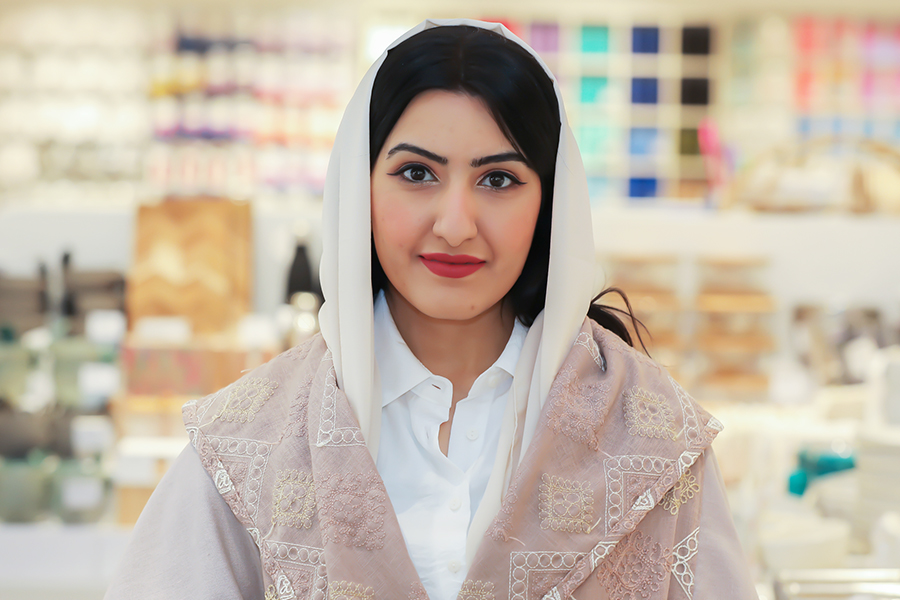
Words by Sukainah Al Zaid, Brand Director at Alhokair Fashion Retail
On April 1, 2022, the announcement of the 100% implementation of Saudization in shopping malls and closed commercial spaces came into effect, potentially creating 51,000 jobs. Earlier this year, the Saudi government announced its plan to “Saudize marketing and support management jobs,” an initiative likely to generate more than 12,000 job openings for Saudi citizens. Women, considered the backbone of society, and veritable talent in their own right, are also benefitting from recent reform. According to the General Authority for Statistics, women’s participation in the workforce has increased from 19% to 33% in the Kingdom. This rapid rise in women joining the workforce has helped Saudi Arabia achieve its target of increasing the women’s labour force, empowering them to succeed and contribute to the socio-economic growth of the Kingdom.
The vision behind the move is to provide a stimulating work environment to Saudi citizens and expand opportunities for them in the local employment market. The Ministry has also announced to offer incentives to the private sector for implementing the decisions.
Simultaneously, the Kingdom is also focusing on increasing the employability of Saudi talent. World-class academies have been set up to empower the workforce with essential skills, setting them up for success within the retail ecosystem. Universities are also offering a hybrid, on-the-job learning approach, offering a six-month training program to help students who want to work part-time in the retail industry.
Under Vision 2030, Saudi Arabia’s retail sector development is a key objective of the National Transformation Program. The country is seeing an increase in retail activities, where there are new business opportunities for local and international brands.
Global brands are more widely earmarking the Kingdom as a key entry point to the region. Last year UK-based online retailer Public Desire marked its first-ever expansion into brick-and-mortar operations in the Kingdom by opening a store in Riyadh.
Another groundbreaking expansion saw US-based Alo Yoga open its first global store outside the US. With an increase in a healthy and active lifestyle in Saudi Arabia, Alo Yoga entered the market to build a community where holistic practices such as yoga are becoming a way of life. The retail sector’s ability to attract international brands to enter the market contributes to the growing economy and creates a unique shopping experience that is more than a transactional process.
The Kingdom is a young nation with a high per-capita purchasing power; 70% of the population is below the age of 40; it is imperative to keep them engaged through innovative experiences and earn their loyalty towards the brand as the one-stop destination catering to all their shopping needs and fashion sensibilities. A lifestyle brand that caters to those needs is Flying Tiger Copenhagen, which elevates the shopping experience by bringing customers a unique and fun shopping experience.
According to a leading industry survey, spending will increase in lifestyle categories over the next six months, with a 33% increase in fashion expenditures, while environmental consciousness is another major factor that drives consumers’ preference in the Kingdom. The PWC survey states that 75% of Middle East consumers buy from environmentally conscious brands. Similarly, EY Future Consumer Index 2021 reported that Gen Z and Millennials want to buy sustainably.
Taking cognizance of the trend, several businesses have incorporated sustainable practices. For instance, Flying Tiger is committed to respecting ethical, environmental, and social standards across its value chain and substituting plastic with paper packing.
Flying Tiger is popular among Saudi tourists who have traveled to Europe. Its offering and products fit the Saudi demographic due to the brand’s focus on uniqueness, product relevance, and sustainability. Alhokair plans to open 45 Flying Tiger stores in the Kingdom in five years.
Consumer-centricity at the core
In Saudi Arabia, most people (about 59%) seek the in-store shopping experience. Variety stores would continue to cater to all age groups with an enhanced focus on sustainability. The growth of such stores would not just have an economic but also a cultural impact. The product experience extends beyond the purchase of tangible goods and in-store journeys. Where a brand truly resounds, is by fostering an emotional connection with customers. Ultimately, creating moments that matter, with our friends and families, is what truly resonates.
That is why store visits, even during on-ground events, campaigns, and experiential activation, can help increase footfall and brand recall.
On the other hand, e-commerce is penetrating new geographies in the Kingdom. Significantly, the country also has a strong base of domestic consumers with rising disposable incomes. The coming together of these factors coupled with government support make the Kingdom an attractive retail destination.